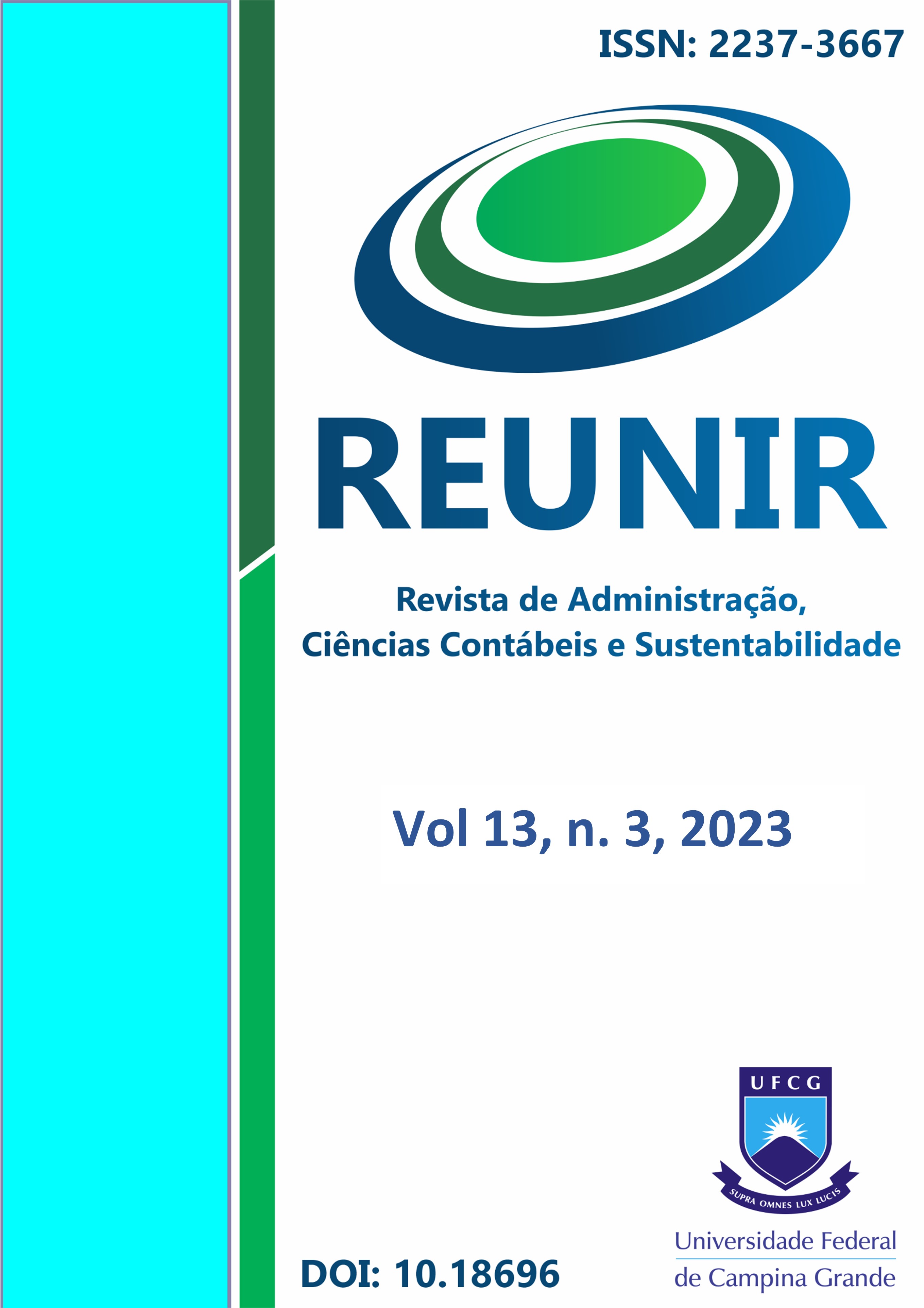Sustainability in the capital market: a study on the performance of the ISE in the Brazilian stock market
DOI:
https://doi.org/10.18696/reunir.v13i3.1416Keywords:
Capital market, Corporate Sustainability Index, Risk and ReturnAbstract
We have discussed a lot about the impacts of human activities on the environment and about the importance of sustainability. Currently, the society started questioning companies and shareholders about the socio-economic impacts and the prioritization of sustainable investments. So, this paper sought to measure the performance of the theoretical portfolio of the ISE (Corporate Sustainability Index), an index of the Brazilian stock exchange, as a way of verifying whether companies operating in sustainable practices perform better, which would be reflected in the returns offered by variations in the prices of its shares. For this purpose, we calculated the performance indicators of portfolios suggested by Sharpe, Treynor and Modigliani & Modigliani over a period of 15 years (2006 to 2020). The results suggested that, in the medium term, the performance of the IBOVESPA surpassed the performance of the ISE, but the same cannot be said when comparing the performance of the indices from a long-term perspective, since, in addition to surpassing the accumulated return of the Ibovespa, the ISE presented the lowest level of risk. Then, the present study contributes to the finance and sustainability literature by providing empirical evidence that investing in companies belonging to the ISE can offer investors greater returns and lower risks in the long-term, compared to Ibovespa. This study also shows that it is possible to develop investment strategies that are aligned with socio-environmental practices, but that also provide a good expectation of return to investors in the long term.
Downloads
References
Amel-Zadeh, A., & Serafeim, G. (2018). Why and how investors use ESG information: Evidence from a global survey. Financial Analysts Journal, 74(3), 87-103. DOI: https://doi.org/10.2469/faj.v74.n3.2
Beato, R. S., Souza, M. T. S. de, & Parisotto, I. R. dos S. (2009). Rentabilidade dos índices de sustentabilidade empresarial em bolsas de valores: um estudo do ISE/Bovespa. INMR - Innovation & Management Review, 6(3), 108-127.
Caplan, L., Griswold, J. S., & Jarvis, W. F. (2013). From SRI to ESG: The Changing World of Responsible Investing. Commonfund Institute. Recuperado de https://eric.ed.gov/?id=ED559300
Contreras-Pacheco, O. E., Avella, A. C. P., & Pérez, M. J. M. (2017). La inversión de impacto como medio de impulso al desarrollo sostenible: una aproximación multicaso a nivel de empresa en Colombia. Estudios Gerenciales, 33(142), 13-23. DOI: https://doi.org/10.1016/j.estger.2017.02.002
Cunha, F. A. F. D. S., & Samanez, C. P. (2014). Análise de desempenho dos investimentos sustentáveis no mercado acionário brasileiro. Production, 24, 420-434. DOI: https://doi.org/10.1590/S0103-65132013005000054
Fernandes, J. L., & Linhares, H. D. C. (2017). Análise do desempenho financeiro de investimentos ESG nos países emergentes e desenvolvidos. Available at SSRN 3091209.
Friede, G., Busch, T., & Bassen, A. (2015). ESG and financial performance: aggregated evidence from more than 2000 empirical studies. Journal of Sustainable Finance & Investment, 5(4), 210-233. DOI: https://doi.org/10.1080/20430795.2015.1118917
Garcia, A.S. (2017). Associações entre desempenhos financeiro e socioambiental: um estudo das circunstâncias em que vale a pena ser verde. 138 f. Tese (Doutorado em Administração de Empresas) – Escola de Administração de Empresas de São Paulo, Fundação Getúlio Vargas, São Paulo.
Garcia, A. S., & Orsato, R. J. (2020). Testing the institutional difference hypothesis: A study about environmental, social, governance, and financial performance. Business Strategy and the Environment, 29(8), 3261-3272. DOI: https://doi.org/10.1002/bse.2570
Liang, H., & Renneboog, L. (2020). Corporate social responsibility and sustainable finance: a review of the literature. European Corporate Governance Institute–Finance Working Paper, (701).
Lucas, E. C., Yoshikuni, A. C., & Di Agustini, C. A. (2022). Relação de causalidade entre os índices de sustentabilidade empresarial e Ibovespa no Brasil. REUNIR Revista de Administração Contabilidade e Sustentabilidade, 12(3), 30-42.
Marcondes, A. W., & Bacarji, C. D. (2010). ISE–Sustentabilidade no mercado de capitais. Report.
Markowitz, H. M. Portfolio Selection, 1952. Journal of Finance, 7 (1), 77-91.
Milani, B., Righi, M. B., Ceretta, P. S., & da Veiga Dias, V. (2012). Práticas de Sustentabilidade, Governança Corporativa e Responsabilidade Social afetam o risco e o retorno dos investimentos? Revista de Administração da Universidade Federal de Santa Maria, 5, 667-682.
Modigliani, F., & Modigliani, L. (1997). Risk-adjusted performance. Journal of portfolio management, 23(2), 45-54.
Naum, C. M. (2018). Motivações para adoção dos fatores ambientais, sociais e de governança (ASG) às análises de investimento pelos gestores de ativos. 121 f. Dissertação (Mestrado em Administração) – Escola Superior de Propaganda e Marketing, São Paulo.
Paz, F. J., & Kipper, L. M. (2016). Sustentabilidade nas organizações: vantagens e desafios. Revista Gestão da Produção Operações e Sistemas, 11(2), 85. DOI: https://doi.org/10.15675/gepros.v11i2.1403
PRI. (2020). Principles for Responsible Investment. Disponível em: https://www.unpri.org/
PricewaterhouseCooper [PwC]. (2022). The growth opportunity of the century: are you ready for the ESG change? PwC. Recuperado de: https://www.pwc.lu/en/sustainable-finance/esg-report-the-growth-opportunity-of-the-century.html
Sharpe, W. F. (1966). Mutual fund performance. The Journal of business, 39(1), 119-138.
Serra, R. G., Felsberg, A. V., & Fávero, L. P. L. (2017). Dez anos do ISE: uma análise do risco-retorno. Reunir- Revista de Administração, Contabilidade e Sustentabilidade, 7(2), 29-47.
Treynor, J. (1965). How to rate management of investment funds. s. Harvard Business Review, 43, 63-75.
Umlas, E. (2008). The global expansion of SRI: Facing challenges, meeting potential. Development and Change, 39(6), 1019-1036. DOI: https://doi.org/10.1111/j.1467-7660.2008.00527.x
Vasconcelos, S. R. M., dos Santos, J. O., Marion, J. C., & Bergmann, D. R. (2019). Análise da rentabilidade dos fundos de investimentos sustentáveis brasileiros no período 2010-2016. Revista Contemporânea de Contabilidade, 16(39), 89-112. DOI: https://doi.org/10.5007/2175-8069.2019v16n39p89
Von Wallis, M., & Klein, C. (2015). Ethical requirement and financial interest: a literature review on socially responsible investing. Business Research, 8(1), 61-98.
World Comission on Environment and Development [WCDE]. (1987). Our Common Future. Oxford: Oxford University Press.
Downloads
Published
How to Cite
Issue
Section
License
Copyright (c) 2024 REUNIR Revista de Administração Contabilidade e Sustentabilidade

This work is licensed under a Creative Commons Attribution-NonCommercial 4.0 International License.
Declaração de Direito Autoral
Direitos Autorais para artigos publicados nesta revista são do autor, com direitos de primeira publicação para a revista. Em virtude de ser um periódico de acesso público, os artigos são de uso gratuito, com atribuições próprias, em aplicações educacionais e não-comerciais, com caráter científico.
A Revista REUNIR adota Licença Creative Commons Atribuição-Uso não-comercial 3.0 Brasil License ou seu equivalente.







